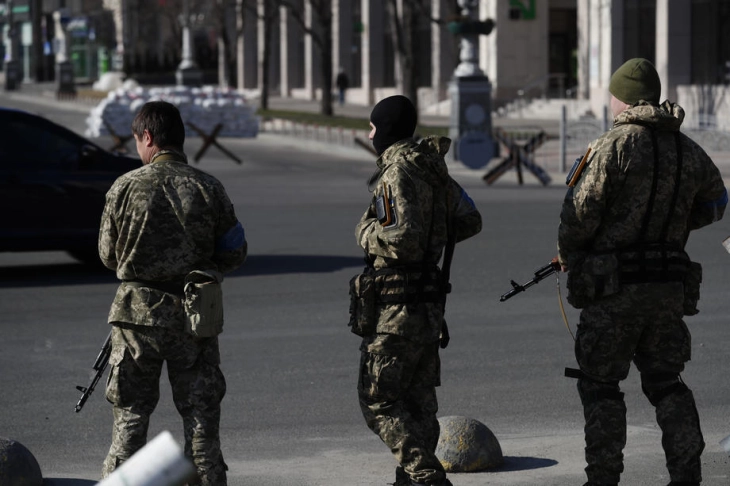Russia downs two Ukrainian fighter jets, combat helicopter

Berlin, 11 April 2022 (dpa/MIA) - Russian troops have destroyed another 78 Ukrainian military targets, as Ukraine sought to evacuate civilians from multiple besieged cities in the country's south and east where Moscow is concentrating its attacks.
"Russian air defence systems shot down two Ukrainian Su-25 fighter jets near the [north-eastern] locality of Izyum," Russia's Defence Ministry spokesperson Igor Konashenkov said on Monday, adding that a Ukrainian Mi-24 combat helicopter was also shot down in the southern Kherson region.
Konashenkov said several Ukrainian command posts, air defence systems and depots for both ammunition and fuel had also been destroyed.
Russia gives frequent updates about Ukrainian military equipment and sites it has destroyed but claims to not target civilians, despite overwhelming evidence to the contrary.
Russian President Vladimir Putin ordered the invasion of neighbouring Ukraine on February 24. While the attack was originally launched from the north, east and south, Russian forces say they are now focusing on the east of Ukraine, after failing to make progress to capture the Ukrainian capital Kiev.
However on Monday, the Ukrainian army's General Staff issued a warning about Russian troops stationed in Moldova, saying that Moscow could use the country to launch an attack on Ukraine from the west.
"It cannot be ruled out that the Russian armed forces will carry out provocations on the territory of the Transnistria region in the Republic of Moldova," it said.
Transnistria, which lies on Ukraine's western border, belongs to Moldova under international law but has been controlled by Russia since 1990.
Should Russian troops from Transnistria and paramilitary groups loyal to Moscow from the region intervene in the war, there is a potential threat of encirclement to Ukrainian forces in the south of the country, especially around the Odessa region.
Meanwhile Kiev reported a further concentration of Russian troops in eastern Ukraine, including troops redeployed from Siberia and the Russian Far East.
"It is likely that the occupiers will try to renew their offensive in the next few days," the Ukrainian General Staff stated.
As fighting continued, the Ukrainian government set up nine humanitarian escape routes to enable civilians to evacuate the embattled cities of eastern Ukraine.
A route has been set up to allow private vehicles to travel from the southern city of Mariupol in the south to the city of Zaporizhzhya, Deputy Prime Minister Iryna Vereshchuk said on Telegram.
Mariupol, one of the cities hardest hit by fighting, has been under siege for weeks, with the remaining civilians there unable to access food, water or medicine.
Vereshchuk said escape routes for private vehicles would also be established from the city of Berdyansk and two others in the region.
Meanwhile, there were five corridors leading from the contested areas in the Luhansk region to the city of Bakhmut, Vereshchuk wrote.
Moscow-backed separatists have controlled parts of the south-eastern Ukrainian regions of Donetsk and Luhansk, known collectively as the Donbass, for almost eight years.
Russia and Ukraine have repeatedly accused each other of sabotaging attempts to evacuate civilians from Ukrainian towns and cities as Russia continues to attack its neighbour.
Ukrainian President Volodymyr Zelensky continued to call for more support from the international community on Monday. He asked South Korea to alter its policy and to supply him with weapons during a video address to the National Assembly in Seoul.
"There can be no hope that Russia will just stop itself," he said in the speech, which was shown on television in both Ukraine and South Korea.
"We need air defence systems, we need aircraft, tanks, other armoured technology, artillery systems and ammunition," he said, appealing to both South Korea and the international community.
Zelensky said that he believed tens of thousands of people have been killed by Russians in the besieged port city of Mariupol alone, a higher figure than the "thousands" spoken of by other Ukrainian officials.
Austrian Chancellor Karl Nehammer travelled to Moscow on Monday for a meeting with Putin to discuss the war as well as, potentially, Russia's gas supply to Europe, Kremlin spokesperson Dmitry Peskov said.
Nehammer is the first EU leader to be received by Putin since Russia launched its invasion of Ukraine. His trip was welcomed by German Chancellor Olaf Scholz, who praised "any diplomatic efforts aimed at bringing an end to the fighting in Ukraine and creating basic conditions for negotiations between Ukraine and Russia," according to a spokesperson.
Other governments also sought to increase pressure on Moscow.
Croatia expelled 24 diplomats from Russia's embassy in Zagreb, the Foreign Ministry told Russian Ambassador Andrei Nesterenko. The ministry summoned Nesterenko and urged Russia to end its "brutal aggression against Ukraine" and to immediately withdraw its forces from the country, the ministry said.
In Riga, meanwhile, around a dozen people gathered to protest against the war in front of the German embassy, seeking to persuade Germany and other European countries to take tougher action.
The demonstrators laid down on the ground, recreating an image of the civilians who were killed in the Kiev suburb of Bucha. They laid with their hands behind their backs and black plastic bags over their heads, photos published online showed.
"We are signalling that innocent people are dying and those responsible are not doing enough to protect them," organizers told Estonian Radio.







